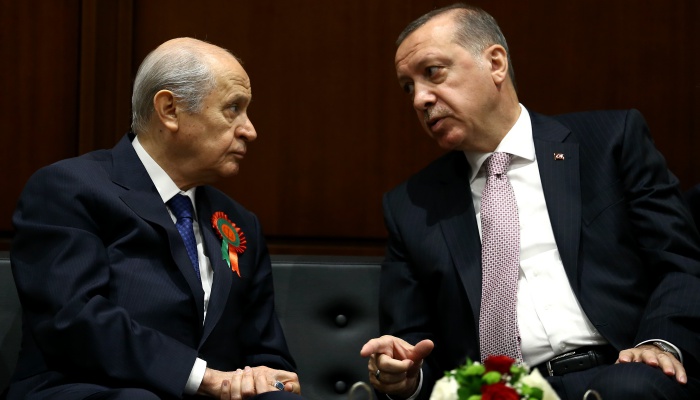On Monday morning the leader of Turkey’s Nationalist Movement Party (MHP), Devlet Bahçeli, posted furious tweets aimed at President Recep Tayyip Erdoğan for his latest remarks on a general amnesty proposal.
“We can’t issue a general amnesty when over 50,000 prisoners were convicted of drug trafficking,” Erdoğan said during a rally in İstanbul on Sunday.
Nobody was forced to approve the proposal, there was no pressure, Bahçeli responded in tweets. But denigrating the MHP at political rallies would not be in accordance with political ethics or good judgment, he added.
The MHP submitted a proposal to parliament on Sept. 24 foreseeing a five-year reduction in prison time for convicted criminals, with the exception of terrorists, murderers and sexual abusers.
However, it has been on the party’s agenda since May, when Bahçeli called for a general amnesty that would include notorious mafia bosses Alaattin Çakıcı and Kürşat Yılmaz.
Until the submission of the official bill President Erdoğan repeatedly rejected the idea of an amnesty, and after the MHP’s parliamentary motion he said it should be rephrased so that the “public conscience” would not be offended.
It was the tipping point for Bahçeli, who had formed an alliance with Erdoğan and his ruling Justice and Development Party (AKP) for the presidential and parliamentary elections on June 24.
With the help of the nationalists Erdoğan garnered 52 percent of the vote in the first round and became the first president of modern Turkey after the introduction of an executive presidency in a narrowly backed 2017 referendum.
The MHP appears to have secured the appointment of its supporters to key posts in the bureaucracy out of this deal with AKP.
As the local elections scheduled for March approach, the subject of much debate is whether the AKP and MHP will resume their alliance, especially for races in metropolitan municipalities.
According to a state-run Anadolu news agency report on Aug. 16 Bahçeli was not eager to form an alliance with the AKP. Later, however, Bahçeli and Erdoğan met a few times to discuss the terms and conditions of a possible alliance.
The AKP’s main objective for the upcoming local elections is to maintain control of İstanbul and Ankara. The mayors of both cities had resigned and were replaced by less popular people in municipal council elections.
Bahçeli made the offer to Erdoğan that his party would not nominate a candidate for İstanbul and would support the AKP’s candidate; however, in return, he wanted the AKP to refrain from nominating candidates for several cities in Anatolia.
Erdoğan reacted negatively to this offer on Sept. 28. “I can’t justify not nominating a candidate in the cities where we are the strongest party,” he said.
Some AKP officials also criticized nominating joint candidates with the MHP for some municipalities, arguing that it would create confusion in people’s minds and risk losing the elections.
On Oct. 18 Bahçeli and Erdoğan met again and expressed their will for a continuation of the alliance, and they tasked delegations with hammering out its terms and conditions. According to a CNN Türk report, in a final meeting before kicking off the election campaign the two leaders will agree on a formula.
Yet, Bahçeli’s tweetstorm on Monday was regarded a crack in the nationalist alliance.
AKP spokesperson Ömer Çelik, in response to Bahçeli, said respect for the president was their “red line.” But he added that not every disagreement would amount to an end to the alliance. Obviously there are other disagreements, reflected on the media from time to time.
Observers, on the other hand, think the AKP does not need MHP support in the local elections since there seems to be no strong alternative to AKP rule in metropolitan cities.
On June 24 Erdoğan garnered over 50 percent of the vote in both İstanbul and Ankara. His main rival, Republican People’s Party’s (CHP) candidate Muharrem İnce, was came in at 36 percent.
All in all, the AKP’s only rival in the poll will be an economic crisis that has led to a weak Turkish lira and high inflation, unless the opposition can manage to find popular candidates.

